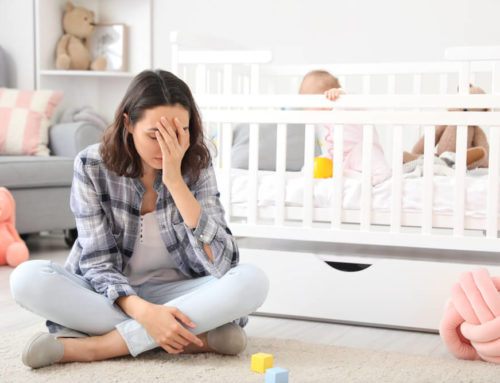Having a new baby in your life can be both a marvelous and a frightening experience. Your life is changing, and nothing is the same anymore, and it won’t be. And no matter how much you’ve prepared for this moment, no one can be fully prepared for things like postpartum depression.
Depression that happens after childbirth can affect anyone, and in many cases, can’t be prevented. It happens to around 15% of women, it’s considered a severe condition, and you should treat it with professional help.
This article is for all the new dads struggling to understand their new life circumstances. We at Trogolo Obstetrics and Gynecology care about men also and want to help them understand their partners who just gave birth. We will talk about postpartum depression and everything you need to know about it from a man’s perspective and finally, what is the best way you can help.
What Does Postpartum Mean?
The period of the first six weeks after childbirth is referred to as the postpartum period. It is a healing period, both physically and mentally. During this period, mothers will adjust to their new babies, bond with them, and tune in to the new way of living.
In the following days after giving birth, mothers can encounter a strange feeling of baby blues. It happens to a lot of women, around 50 to 75 percent of them. Baby blues usually occurs few days after giving birth and doesn’t last more than a few weeks. Throughout this time, women can feel sad, exhausted, and even anxious. But all of that is entirely normal and common, even if a lot of crying follows it.
Yet, on the other side, some women can experience postpartum depression. A condition like this is much more severe than baby blues and should be treated as soon as possible.
What Is Postpartum Depression?

PPD isn’t that common like baby blues, but it can happen to anyone. It is considered to be an acute condition with symptoms similar to the ones occurring during baby blues. But the signs are much more intense, and they can last for weeks or even a year.
Women experiencing postpartum depression can feel anxious, sad, exhausted, and without energy. Many also come up against the feeling of hopelessness, guilt, and unworthiness.
Extreme and frequent mood swings are common, alongside intrusive thoughts. Many women also find it hard to take care of their newborn babies and themselves.
How to Recognize PPD in Your Wife?
PPD can easily be confused with feeling just a little bit blue after childbirth. That’s why it’s not that easy to recognize symptoms of postpartum depression in your wife.
With our help and a bit of dedication, you can do it, and with that, help your partner overcome it.
Everyone that has ever had an experience with an infant knows how it can be challenging for both parents. During the early days, postpartum sleep is draining because sleep is limited. You now have a human being that you need to care for, and you don’t know how exactly. Women are struggling with their body image since their bodies now look totally different than ever before. Sex postpartum can be intimidating and confusing for both partners. And above all, the mental effort to stay on top of everything is high.
Due to that, some women can’t efficiently deal with this stressful new situation in their lives.
The Symptoms of PPD
The most reliable way to recognize PPD in your wife is to observe and notice the typical symptoms, that can be:
- She is feeling tired, often exhausted but can’t sleep
- She is sleeping too much
- She has been crying a lot for an extended time but can’t explain why
- She is overeating, and she hasn’t done it before
- She is eating too little and has lost interest in food
- She doesn’t have a desire for sex postpartum
- She is easily irritated and gets angry often
- She is often anxious and gets panic attacks
- She doesn’t feel like she is in control of her life
- She feels like she is a bad mother and a bad wife
- She feels guilty about having her own needs
- She didn’t connect with the baby
- She has intrusive thoughts about hurting herself
- She has intrusive thoughts about hurting the baby
We believe that it’s not easy to read these signs of PPD, but it’s of utmost importance to acknowledge them and be on the lookout for some.
Men postpartum can be of great help to their partners and help them overcome this struggling period.
Women often don’t ask for help, either because they don’t know how or are not aware that they have a problem. However, they often subtly give “calls for help,” even if they are unaware of it. And men postpartum should notice those calls and gently respond to them.
These so-called “calls for help” are never direct, and instead, they can be misunderstood for rudeness.
Like other forms of depression, postpartum one can is a severe mental condition, and often, women are not aware of their actions and consequences.
If your wife is often angry with you and starts fights and spats, but without a real reason, that can be a warning sign. Almost all women have problems with postpartum sleep. But if you notice drastic changes in sleep patterns that are not even normal for postpartum sleep, alongside the feeling of numbness, it can be a sign of PPD.
Often clear indicators of PPD are statements that your wife gives daily. Sometimes those can be about her feelings, and sometimes about intrusive thoughts that she has. If your wife is often saying that she thinks her baby hates her, that she doesn’t know what to do, or that she is a failure of a mother, don’t take those statements lightly.
Also, if she is often talking about how she would like to run away and never come back or would rather die, don’t ignore it. It can be a clear sign of PPD, and you need to act upon it.
What Can You Do?
Men postpartum don’t get it easy too, and they likewise have their problems. Men also have trouble with postpartum sleep and difficulties with sex postpartum. Sadness, exhaustion, and a sense of hopelessness are often present in men too. And men can suffer from paternal postpartum baby blues easily.
But if you feel like you can get through it and notice some of the signs of PPD in your wife, you need to help her. You should know that everything that’s happening with your wife can be easily treated with the help of a professional.
You shouldn’t get defensive, and you shouldn’t attack your wife, even if she does it first. It’s vital to know that she is not doing it on purpose because she doesn’t know how to handle the situation that she’s in currently.
She needs your full support and empathy now, and you need to be strong for both of you and the baby.
Talk to Your Wife
The conversation is always a good first step in solving every problem. Talk to your wife, and explain to her what you think is happening. If she gets defensive, be gentle with her, and try to give her much-needed support. Tell her how much you care for her, how great of a person she is, and encourage her that everything happening will pass.
Find Help
To treat PPD in most cases, it’s necessary to combine both medication and therapy. Advise your wife to get help from a medical professional and accompany her everywhere she needs to go. If it’s necessary, you can also go to therapy with her or do counseling.
Be Her Support System

It’s not over when she starts her therapy, and the period ahead of you can be challenging. You should be there to help her navigate this new situation in her life. It would help if you helped with the baby, other chores in the house, and just be there if she needs you.
We Are Here to Help You
Every change in life can be stressful, and one of the most demanding changes is having an infant and trying to harmonize your life with it. Due to that, PPD is common, and it even happens in men.
Here at Trogolo Obstetrics and Gynecology, our primary goal is helping women overcome their problems, and we want to help you too. If you suspect that your partner is coping with PPD, please call us and schedule an appointment to suggest the best possible treatment. And remember that the proper treatment can solve your problems quickly.



